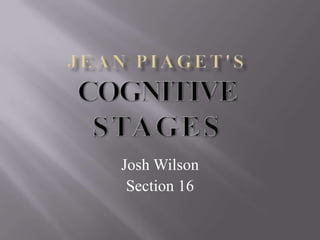
Cognitive dev power_point-1
- 1. Jean Piaget'sCognitiveStages Josh Wilson Section 16
- 2. Sensorimotor(Birth-2 years) In this period, intelligence is demonstrated through motor activity without the use of symbols. World knowledge is limited (but developing) because it is based on physical interactions and experiences. Children acquire object permanence, memory, and physical development, mobility, which allows the child to begin developing new intellectual abilities. Some symbolic or language abilities are developed at the end of this stage. Wheely Bugs are great for physical development. They will allow your baby to develop motor skills and explore their environment with ease! Available in Cow, Mouse, Tiger, Lady Bug, and Bumble Bee $59.00-$69.00
- 3. Pre-operational(ages 2-7) Read! Read! In this period, intelligence is demonstrated through the use of symbols, language use matures, and memory and imagination are developed, but thinking is done in a non-logical, non-reversible manner. Egocentric thinking predominates Start teaching your baby to read today. Your Baby Can Read! is the early reading program for children between the ages of 6 months to 5 years and best of all it's fun and effective! New $89.95 Used $50.00
- 4. CONCRETE(Ages 7-11) In this stage, intelligence is demonstrated through logical and systematic manipulation of symbols related to concrete objects. Operational thinking develops and egocentric thought diminishes. Chronology is both a fun and challenging game for the whole family to enjoy. This game will help your child to put events in history in order. Prices may vary
- 5. Formal Operations(11-Adulthood) The computer game “The Sims” allows children to reason through hypothetical problems and situations. It lets a person create and control simulated people’s lives. One can create and manipulate the simulated person’s personality, skills, appearance, and destiny. Prices may vary. In this stage, intelligence is demonstrated through the logical use of symbols related to abstract concepts. Early in the period there is a return to egocentric thought. Only 35% of high school graduates in industrialized countries obtain formal operations; many people do not think formally during adulthood.
